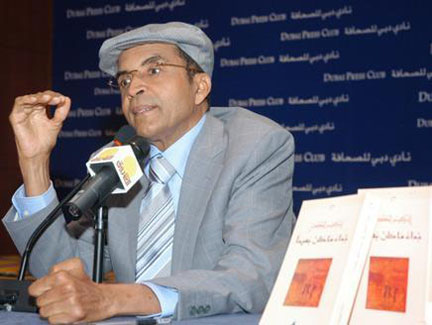
Al-Arabiya, December 16, 2010
CAIRO (Arab Media House)
Libyan novelist Ibrahim al-Koni received in Cairo the Arab Novel Award and dedicated the value of the prize to the children of the Tuareg tribes from which he originally hails.
At the closing ceremony of the fifth round of the Cairo Novel Conference, prominent Libyan author Ibrahim al-Koni was chosen from 23 competitors to receive the Arab Novel Award, whose value is 100,000 Egyptian pounds ($18,000).
“Koni was chosen for his ability to breathe life into the desert on the human, natural, spiritual, and mythological levels,†said Syrian critic Sobhi Hadeedi, who headed the jury.
The committee in charge of choosing the winner praised Koni’s ability to utilize folklore, oral tradition, death rituals, and aspects of everyday life in order to create a literary work.
“He creates his own individual anthropology,†added the committee statement.
Children of Tuareg
Upon receiving the prize from Egyptian Minister of Culture Farouk Hosni, Koni announced that he wants to donate the money to the children of the Tuareg, the tribes that inhabit the desert interior of North Africa and from which he also hails. Koni specified that he wanted the Tuareg children in Niger and Mali to be the beneficiaries of his award.
Ibrahim al-Koni, born in 1948 in the desert town of Ghadames in the Fezzan region in southwestern Libya, studied comparative literature at the Russian Maxim Gorky Literature Institute and worked as a journalist in Warsaw and Moscow.
He wrote all his books in Arabic, which he learnt when he was twelve, and his novels were translated into 35 languages.
Koni is the recipient of numerous awards, on top of which is the Swiss State Award for his novel Bleeding of the Stone in 1995, the Libyan State Award for all his work in 1996, and the Japanese Translation Committee Award for his novel Gold Dust in 1997.
He also received the French Order for Literature and Arts in 2006 and the Sheikh Zayyed Book Award in 2007.
Saudi author Abdul Rahman Munif received the first Arab Novel Award, given every two years, followed in 2003 by Egyptian author Sonallah Ibrahim, who refused to receive the award from a government that “does not possess the credibility to
grant it.â€
In 2005, the third award went to Sudanese author Tayyeb Saleh and the fourth in 2008 to Egyptian author Edward al-Kharrat.
Controversy-rife conference
The Arab Novel Conference was rife with controversies due to the almost complete absence of young writers and the indifference with which many veteran writers were treated.
Novelist Mohammed Gibril apologized for not attending the conference because of the way organizers ignored his history as a prominent writer.
“They treated me as a critic only and asked me to take part in a discussion of a short story collection,†he said. “That is why I refused to attend the conference in general.â€
Gibril added that his decision to boycott the conference was not at the spur of the moment and that he generally does not attend conferences and literary forums.
“I prefer to dedicate all my time to writing.â€
According to Gibril, the problem with conferences is that usually two or three people are in charge while the rest are excluded.
“These conferences follow the opposite of what should happen. Instead of holding a conference to discuss a specific issue that is already open for debate, they hold the conference then look for the issue to be discusses. That is where objectivity disappears.â€
As a prominent figure in the literary scene, writer Ahmed al-Sheikh expected to be a member of the organizing committee.
“I was not even invited to attend, so I decided to boycott the conference.â€
Sheikh added that a general state of indifference pervades official cultural institutions and that this is the reason for the problems in the organization of literary conferences that are supposed to serve the general cultural atmosphere in the country as well as writers themselves.
“However, the problem is not in the conference itself, but in those who organize it.â€
The most important aspect of any literary form is that it provides the chance for writers from different countries and age groups to meet and exchange knowledge and experience, said Egyptian author Mikkawy Said.
“This will never happen if we keep inviting the same people over and over again and ignoring the new generations of writers who were almost completely absent from the conference.â€
For critic Mohammed Qotb, organizers of literary conferences focus on inviting writers who attract the media and are good at being in the limelight rather than prolific ones with a long history in the writing career.
“Organizers of the Arab Novel Conference also ignored several literary bodies like the Egyptian Story Club, the Writers’ House, Cairo Atelier, and League of Literature,†he said.
“I told them in previous rounds that they have to invite them because of the value they add to conference, but they didn’t listen to me.
Fruitful conference
Critic Youssef Nofal agreed that the conference’s organizing committee is to blame for not inviting several prominent figures, yet argued that the conference was still fruitful on many levels.
“The conference tackled Arab novels from various points of view and hosted a wide spectrum of Egyptian and Arab writers,†he said. “There was also variety in the sessions that were sometimes moderated by the writers or critics themselves.â€
According to critic Sherif al-Gayyar, the most distinguishable feature of the conference is its Arabism.
“The conference included 200 writers and researchers from all over the Arab world and this allows for fruitful discussions.â€
Note: Koni’s book The Seven Veils of Seth is available in English translation from Ithaca Press.